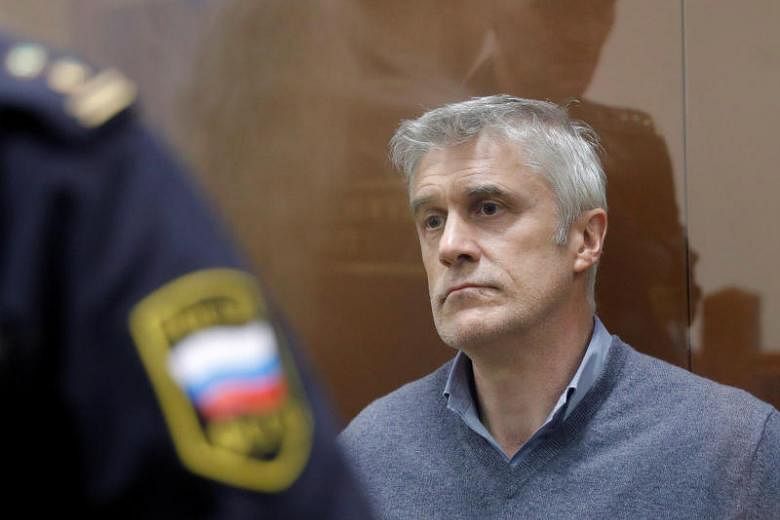SAINT PETERSBURG (AFP) - Russia opened its showcase annual economic forum on Thursday (June 6), seeking to reassure foreign investors who have been shaken by recent arrests and slowing growth.
Dubbed the "Russian Davos" when the economy was booming, the Saint Petersburg International Economic Forum is hosted by President Vladimir Putin and this year comes amid an ongoing crisis with the West.
In a sign of Moscow's commercial and political pivot to the East, the guest of honour at the forum is Chinese leader Xi Jinping, who will speak alongside his host and United Nations Secretary-General Antonio Guterres on Friday.
But on the minds of most at the event will be the arrest in February of prominent US businessman Michael Calvey - the founder of one of the oldest private equity firms focusing on Russia.
He was arrested along with five others on fraud charges but insists he is innocent, saying the case was fabricated and stems from a shareholder dispute.
Calvey, head of the Baring Vostok fund, has since been placed under house arrest, while his French colleague Philippe Delpal remains in pre-trial detention.
Mr Alexei Kudrin, a former finance minister who now heads the Russian Audit Chamber, told the forum that the case had been a "shock for the economy".
"Since the beginning of this year, capital flight has doubled and is now more than US$40 billion (S$55 billion)," said Mr Kudrin, who has previously criticised the charges.
Finance Minister Anton Siluanov said there was too much discussion of the Baring Vostok case in particular, arguing that the question of judicial independence should be looked at as a whole.
Running until Saturday, this year's forum in Mr Putin's native city is expected to draw some 17,000 participants, according to the Kremlin, the same number as last year.
The event comes as the recovery of the Russian economy has slowed considerably since the beginning of 2019.
After two years of recession - caused by a fall in oil prices and sanctions for its role in the Ukraine crisis - Russia returned to growth in 2017. But its economy ticked up by only 0.5 per cent in the first quarter of this year.
Moscow desperately needs investment if it is to fulfil the ambitious goals announced by Mr Putin at the start of his fourth term in the Kremlin last year.
These so-called national projects - ranging from healthcare to infrastructure - are scheduled to be completed by 2024 and will cost Russia US$388 billion.
Some US$115 billion of this has been earmarked from private - Russian or foreign - investment.
"If we do nothing, we could enter recession by 2021," said Economy Minister Maxim Oreshkin, citing risks associated with the consumer credit bubble.
Mr Kudrin, an influential voice in the Russian business community, meanwhile, warned that the Kremlin's goal of exceeding 3 per cent growth would not be achieved without significant structural reforms.
Calvey's case "will be the focal point of a lot of discussion" at the forum, said Mr Chris Weafer, senior partner at the Macro Advisory consulting firm.
Calvey and Baring Vostok would be the "elephants in the room - uninvited and unwelcome but impossible to ignore", he said.
US ambassador to Russia Jon Huntsman will boycott the forum in protest over Calvey's arrest.
France, meanwhile, will send its ambassador but no minister. This is in contrast to last year when President Emmanuel Macron led a large French delegation at the forum.
This week, the Kremlin said it wished that Calvey could attend the forum and hoped that he and his French colleague Delpal would be released in the future.
But there was no sign from the investigators on Thursday that Calvey would be allowed the trip.
Chief economist Charles Robertson at Renaissance Capital said the Calvey case sent a "negative message about the business climate" and "ran against Russia's investment interests".

